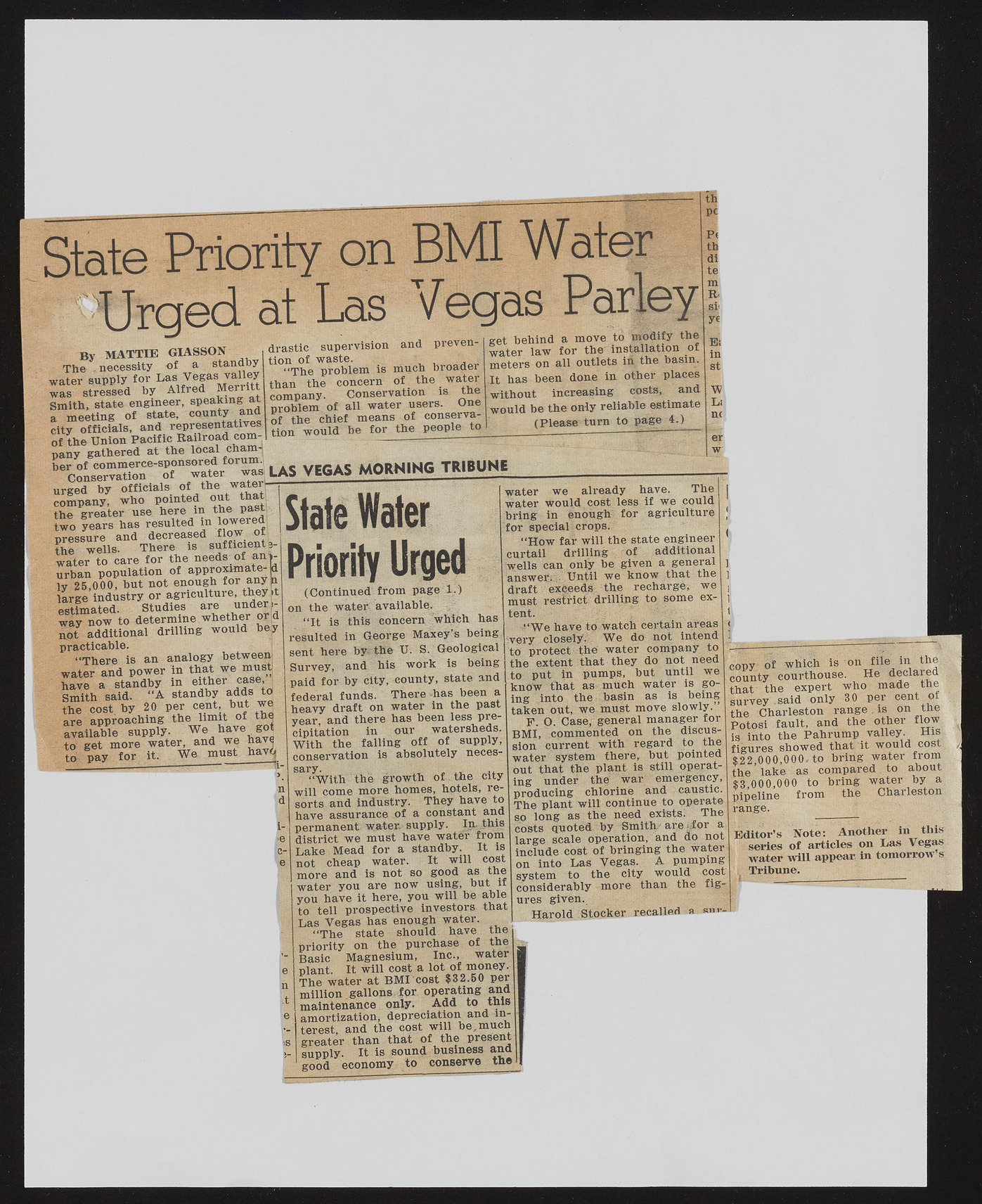Copyright & Fair-use Agreement
UNLV Special Collections provides copies of materials to facilitate private study, scholarship, or research. Material not in the public domain may be used according to fair use of copyrighted materials as defined by copyright law. Please cite us.
Please note that UNLV may not own the copyright to these materials and cannot provide permission to publish or distribute materials when UNLV is not the copyright holder. The user is solely responsible for determining the copyright status of materials and obtaining permission to use material from the copyright holder and for determining whether any permissions relating to any other rights are necessary for the intended use, and for obtaining all required permissions beyond that allowed by fair use.
Read more about our reproduction and use policy.
I agree.Information
Digital ID
Permalink
Details
Member of
More Info
Rights
Digital Provenance
Publisher
Transcription
?Hj pi State Priority on BMP Water Rjrqed at Las Vegas Parley miairan. hehind a move to modify the and preven- drastic supervision tion of waste, “The problem is much broader than the concern of the water company. Conservation is the problem of all water users. One of the chief means of conservation would be for the people to By MATTIE GIASSON The .necessity of a standby water supply for Las Vegas valley was stressed by Alfred Merritt Smith, state engineer, speaking at a meeting of state, county and city officials, and representatives of the Union Pacific Railroad company gathered at the lOcal cham- beCoLe“aXne'SoTnTafer wasLAS VEGAS MORNING TRIBUNE urged by officiate of the. water get behind water law for the installation of meters on all outlets in the basin. ,It has been done in other places without increasing costs, and would be the only reliable estimate (Please turn to page 4.) P< tb di te m R. sjl< yc E: in st w Li nc er w company, who Pointed out thatj the greater use here in the past two years has resulted in lowered pressure and decreased flo . I ?he wells. There is sufficient s- water to care for the needs of ant- urban population of approximate-G ly 25,000, but not enough for anyn large industry or agriculture, they t estimated. Studies are under^ way now to determine whether ord not additional drilling would bey practicable. “There is an analogy between water and power in that we must! have a standby in either case, | Smith said. “A standby adds to the cost by 20 per cent. but we are approaching the limit of the available supply. w®h^ellfvj - to get more water, and we have to pay for it. We must havtj (Continued from page 1.) on the Water, available. “It is this concern which has resulted in George Maxey s being sent here by- the U. S. Geological Survey, and his work is being paid for by city, county, state and federal funds. There-has been a heavy draft on water in the past year, and there has been less pre- cipitation in our watersheds. With the falling off of supply, conservation is absolutely necessary. „ ., “With the growth of the city will come more homes, hotels, resorts and industry. They have to have assurance of a constant and permanent water, supply. IiiJ;his district we must have water from Lake Mead for a standby. It is not cheap water. It will cost more and is not so good as the water you are now using, but if you have it here, you will be able to tell prospective investors that Las Vegas has enough water. “The state should have the priority on the purchase of the Basic Magnesium, Inc., water plant. It will cost a lot of money. The water at BMi cost $32.50 per million gallons, for operating and maintenance only. .Add to this amortization, depreciation and interest, and the cost will be,much greater than that of the present supply. It is sound business and good economy to conserve the water we already have. The water Would cost less if we could bring in enough for agriculture for special-crops. “How far will the state engineer curtail drilling of additional wells can only be given a general answer.:.. Until we know that the draft exceeds, the recharge, we must restrict drilling to some extent. “We have to watch certain areas ?very closely. We do . not intend to protect the water company to the extent that they do not need to put in pumps, but until we know that as much water is go ing into the basin as is being taken out, we must move slowly. F. O. Case, general manager for BMI, commented on the discussion current with regard to the water system there, but pointed out that the plant is still operating under the war emergency, producing chlorine and caustic. The plant will continue to operate so long as the need exists: The costs quoted by Smith are -.for a large scale operation, and do not include cost of bringing the water on into Las Vegas. A pumping system to the city would cost considerably more than the figures given. Harold Stocker recalled » w- 1 podv of which is on file in the county courthouse. He declared that the expert who made dhe survey-said only 30 per cent Ot the Charleston range. is on the Potosi fault, and the other flow is into the Pahrump valley. His figures showed that it would cost $22,000,000.to bring water from the lake as compared to about $3 000,000 to bring water by a pipeline from the Charleston range. Editor’s Note: Another in this series of articles on Las Vegas water will appear in tomorrow’s f Tribune.

